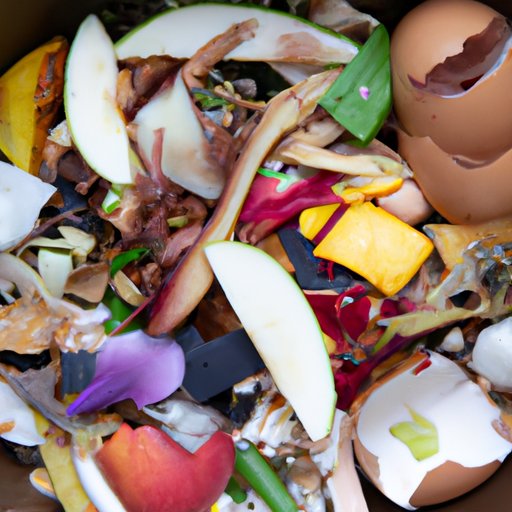Introduction
Composting is the process of breaking down organic matter into nutrient-rich soil that can be used to nourish your garden. Not only is it an incredibly effective way to reduce waste and greenhouse gas emissions, but it can also improve soil health and reduce the need for chemical fertilizers.
If you’re new to composting, it may seem overwhelming, but with a bit of knowledge and some simple steps, you can get started with ease. In this article, we will cover everything you need to know about home composting and how to get started, even if you’re a beginner.
10 Simple Steps to Start Your Home Composting Journey
To get started with composting, follow these steps:
- Choose the right location for your compost pile, making sure it’s in a shady spot that’s close to a water source.
- Select the right container, such as a bin or a wooden box, to hold your compost.
- Add ‘Brown’ materials like dead leaves, paper, or cardboard, and ‘Green’ materials, such as vegetable scraps, grass clippings, and coffee grounds, to your compost pile.
- Alternate between ‘brown’ and ‘green’ materials to create adequate room for airflow between the layers.
- Maintain the right level of moisture by spraying your pile occasionally with water – No more, no less.
- Turn the pile frequently to ensure even decay and aeration.
- Avoid composting certain materials like meat, dairy, or oil that don’t decompose easily or attract pests to your pile.
- Regularly monitor your compost pile, looking for any foul smells, or excessive moistness.
- Know when your compost is ready for use when it’s dark, crumbly, and earthy.
- Use the finished product, which is rich, earthy-smelling, and full of nutrients to your garden or lawn.
The Dos and Don’ts of Composting
Composting is an art that requires understanding what materials can and cannot be composted. Adding the wrong materials to your pile can make it smelly, unpractical, or even unsanitary to work with. Here are a few best practices to keep in mind:
The Dos
- Add fruit and vegetable scraps, eggshells, coffee grounds, tea bags, and grass clippings.
- Keep the pile moist to facilitate decomposition.
- Turn or aerate your compost to prevent it from clumping or drying out.
- Use a compost thermometer to check the temperature of your pile.
The Don’ts
- Avoid meat, dairy, and fatty food waste, which can lead to bad smells and attract pests.
- Avoid adding pet waste or anything that may have been contaminated with pet waste.
- Throw out plastics, metals, or synthetic materials.
- Avoid overwatering or under-watering your pile, as this can slow the composting process.
The Benefits of Composting and Why You Should Start Today
The benefits of composting are countless. Here are a few reasons why it’s a practice worth adopting:
- It reduces waste and greenhouse gas emissions, helping to minimize one’s carbon footprint.
- It improves soil health and contributes to more effective plant growth.
- It reduces the need for chemical fertilizers in gardens and farms.
- It reduces the amount of organic waste sent to landfills, where it decomposes and takes up precious space.
- It can help reduce the impact of food waste by giving it a second life.
Reducing food waste is a major part of fighting climate change and composting is an excellent way to do that. By diverting organic waste from landfills, you can help conserve resources and reduce the amount of excess food in your community.
Composting for Beginners: How to Start Small and Succeed
Starting small can help you adjust to the routine of composting gradually. Here are some tips for starting out:
- Begin with a small bin, like a plastic bucket or bin, and gradually work your way up.
- Learn how to compost using worms or vermicomposting.
- Avoid overcomplicating the process by adding too many materials all at once.
- Consider buying compost from a local source to supplement your own supply.
- Join local composting groups and connect with other gardeners in your community.
Troubleshooting Your Compost: Common Problems and How to Fix Them
Composting at home is an ongoing process that can be disrupted due to certain factors. Here are some common challenges you may encounter and how to tackle them:
- Bad smells can result from not turning your pile, wrong materials, or excess moisture. Check and mix the pile and adjust any factors causing the bad smells.
- If your pile isn’t decomposing fast enough, it may be due to slow decomposition caused by a lack of aeration or nitrogen. Check the moisture levels and layer your pile with nitrogen-rich materials such as grass clippings or food scraps.
- Unwanted pests like rats, raccoons, or flies are a common issue. Fence, cover, or move the pile to prevent pest access.
From Table Scraps to Garden Gold: How to Turn Your Food Waste into Fertile Soil
Repurposing food waste into compost is a great way to give it a second life while improving soil health. Here are some tips for turning scraps into compost:
- Start by collecting food scraps in a compost pail or bin.
- Depending on your space, time, and resources, research the best composting method for you.
- Composting services may be an excellent way to recycle your food scraps if you don’t want to compost them yourself.
- Once your compost is ready, you can use it to nourish your garden or lawn.
Conclusion
Composting may seem challenging at first, but with patience and the tips we’ve provided in this article, you’re well on your way to creating your own rich, nutrient-dense soil. Remember to choose the right spot, add the right materials, and maintain the right level of moisture to create a healthy compost pile. By diverting food waste from landfills and turning it into essential soil, you’re not only helping the environment but also your garden’s overall health.
